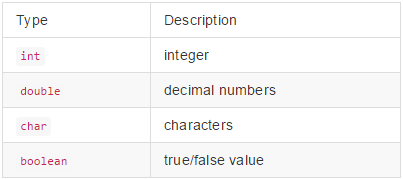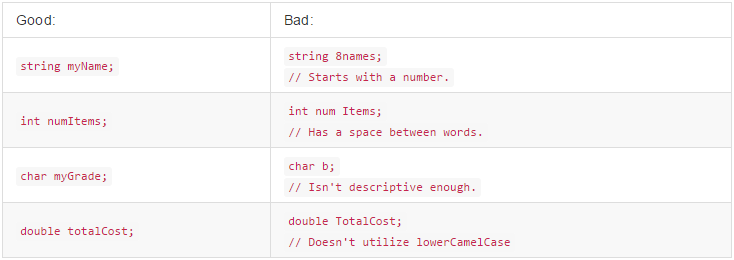Variables and Types
Variables allow us to store information such as numbers, words, or true/false expressions. A variable can be thought of as a box that stores information inside. In Java, variables are composed of three things: a name, type, and value.
Primitive Types
In Java we must specify what type of information we want our variables to hold. You must always give your variable a type before naming it, and specifying the value it holds. (Ex. int myVariable = 10;)
Here are some of the primitive types found in Java:

Numeric Type:
As seen above, primitive numeric types in Java include both integers and doubles.
Integers are whole numbers, or counting numbers. (Ex. -5, -4, -3, -2, -1, 0, 1, 2, 3, 4, 5)
In Java we declare an integer using int before the variable name. Here are a couple of examples:
int itemsInStore = 10;
int numberOfMessages = 8;
doubles are like integers, but can have decimals. (Ex. -54.34, 90.21, 0.1223)
In Java we declare a double using double before the variable name. Here are a couple of examples:
double costOfApple = 1.24;
double milesToRun = 5.64;
Char Type:
Characters represent a single character.
In Java we declare a character using char before the variable name. We also use single quotes to identify a character (Ex. 'A'). Here are a couple of examples:
char currentGrade = 'A';
char favoriteLetter = 'W';
Boolean Type:
Booleans are variables that hold a true or a false value.
In Java we declare a boolean using boolean before the variable name. Here are a couple of examples:
boolean passedCalculus = true;
boolean hasDog = false;
String Type:
Strings are variables that hold text. Strings are not a primitive type, so you must declare them using String with a capital S. Unlike characters, we need to use double quotes when assigning strings (Ex. "This is my string."). Here are a couple of examples:
String fishName = "Dog";
String myUniversity = "Arizona State University";
Naming Variables
Giving your variables meaningful names throughout your code is very important. Proper variable names allow others to easily read and understand your code. A good way to name your variables is to give them as descriptive of a name as possible, without making it too long. For example, int numberOfApplesOnTheTree = 10; is a very long name, and can easily be replaced with a name like int numApples = 10;.
Variable Naming Conventions:
Variable names must start with a letter,
$symbol, or_symbol.Variable names are case sensitive so
myVariableis different thanMyVariableVariable names, after the first character, can contain letters, numbers, or other characters.
Here are some examples of different variable names:
